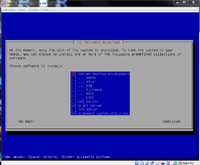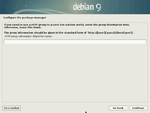Debian: Difference between revisions
| Line 50: | Line 50: | ||
= Post installation = | = Post installation = | ||
[https://averagelinuxuser.com/10-things-to-do-after-installing-debian/ 10 things to do AFTER Installing DEBIAN] | * [https://averagelinuxuser.com/10-things-to-do-after-installing-debian/ 10 things to do AFTER Installing DEBIAN 9] | ||
* [https://www.linuxtechi.com/things-to-do-after-installing-debian-11/ Top 12 Things To Do After Installing Debian 11 (Bullseye)] | |||
<pre> | |||
$ su - root | |||
# apt install sudo -y | |||
# usermod -aG sudo NEWUSER | |||
# su – NEWUSER | |||
$ sudo apt update | |||
</pre> | |||
= Server version = | = Server version = | ||
Revision as of 11:06, 5 March 2022
Download Debian
The beginner's handbook: a simplified manual to install and take-over the Debian system.
Debian: Enjoy One Of The Most Stable And Trusted Linux Distributions. . If you would rather download all necessary basic packages before starting the installation, you may need to look at downloading the “CD1” for your architecture instead.
Go to http://www.debian.org/distrib/ and download "Small CDs or USB sticks", for example debian-8.1.0-amd64-netinst.iso (Jessie, released June 2015). It is about 280 MB.
Screenshots of step-by-step installation can be found in here.
At the end of installation, it will offer a collection of software to install. Below 'Debian desktop environment', it has a selection of GNOME, Xface, KDE, Cinnamon, MATE and LXDE (new in Jessie/8.0). Note that the cd images download page only provides a selection of kde, lxde and xfce desktop. The default is 'GNOME' in Jessie.
After installation, you got a desktop environment of Debian based on GNOME 3 (Virtual machine will use recovery mode, but still works. Some people suggest to install the guest additions (in the guest) and make sure that you enable the 3D acceleration in the guest settings.). Also 'free -m' command shows it uses 202 MB memory and the whole system takes up 3.3 GB. I am testing on a Chinese desktop environment.
When Debian is in recovery mode, the desktop interface is like old fashion. Application and Place on top of the screen. When GNOME 3 is working (in my test of Debian 7.1.0, I cannot run VBoxLinux.run, but it still works after I did other steps), the interface is sort of Ubuntu with application launched from the left hand side. It differs from Ubuntu because the side bar appears by clicking a 'preview' button on top left corner.
The default browser in Debian is Iceweasel with AdBlock Plus preinstalled.
I don't know why the default user does not have root privilege.
When I installed the Chinese version, the keyboard switch icon (SCIM) is automatically available. However once the desktop is in regular GNOME 3, the switch icon disappeared. Fortunately, we can use Ctrl + Space to switch languages. Thanks to the hint there.
Debian 10
Kali linux
Tails linux
The system is designed to be booted as a live DVD or live USB, and will leave no digital footprint on the machine unless explicitly told to do so.
It is hard to use: you don't have the 'sudo' password unless you pay attention to create one at the beginning of the first screen. You can't save file from the browser. It is slow to boot...
How hard it is to install Debian
Tested on Lenovo thinkpad t420s. When it is about to detect network hardware, it popped up a message:
Some of your hardware needs non-free firmware files to operate. The firmware can be loaded from removable media, such as a USB stick or floppy.
The missing firmware files are: iwlwifi-6000g2a-6.ucode iwlwifi-6000g2a-5.ucode.
See
- https://www.linuxquestions.org/questions/debian-26/how-to-provide-non-free-firmware-files-to-the-debian-jessie-installer-4175542680/
- https://wiki.debian.org/Firmware
- https://www.debian.org/releases/jessie/i386/ch06s04.html.en
Post installation
$ su - root # apt install sudo -y # usermod -aG sudo NEWUSER # su – NEWUSER $ sudo apt update
Server version
There is no a server version of iso to download. At the end of installation, it will ask what software to install: Debian desktop environment, Web server, SSH server, Laptop, SQL database, ... We can uncheck 'Debian desktop environment' item.
Compared to Desktop version, the server version takes 1.3GB space and 33MB memory.
The server version does not have 'sudo' command. Use 'su' to switch to 'root' user.
Note that even we installed 'sudo', we can not use 'sudo' from the default user. It will complain xxx is not in the sudoers file. This incident will be reported..
Debian root user from remote access
When you login by SSH, then use the username you have chosen when you installed Debian as the root user is disabled for remote logins. Then run the command "su" to become root user. See howtoforget.com.
Virtualbox guest addition installation
See Virtualbox -> Debian.
Browse iso files
Note that if we want to download the iso image, we should consider using the torrent method. The can see a variety of download options from
http://www.debian.org/CD/ > Downloading Debian CD/DVD images via HTTP/FTP
- (Official) http://cdimage.debian.org/debian-cd/8.0.0/amd64/iso-cd/
- (One of mirrors in US) http://mirrors.kernel.org/debian-cd/8.0.0/amd64/iso-cd/
Permission denied
http://roger.steneteg.org/blog/virtualbox-guest-additions-on-debian/
The script uses /bin/sh as shell and on Debian Wheezy/Jessie /bin/sh is symlinked to /bin/dash. Dash is a more light-weight replacement for Bash, and it turns out that the VirtualBox script does not work as it should when run with "dash".
An easy workaround is to explicitly run the script with "bash" with the following command:
sudo bash ./VBoxLinuxAdditions.run
Browse source code
- http://archive.ubuntu.com/
- https://wiki.ubuntu.com/Kernel/SourceCode
- Find a command's package name
- https://stackoverflow.com/questions/4767821/how-do-i-get-the-ubuntu-source-code

